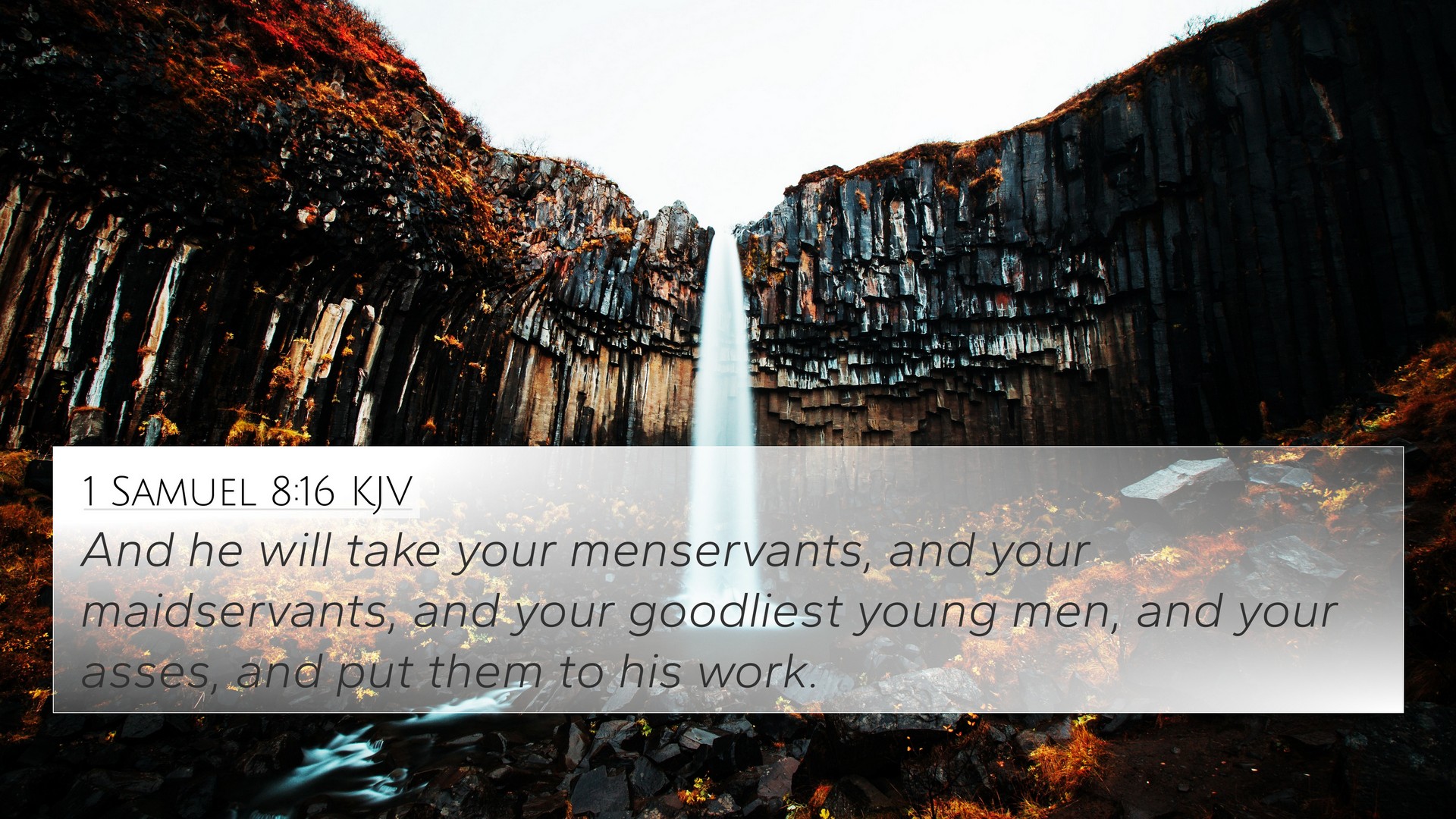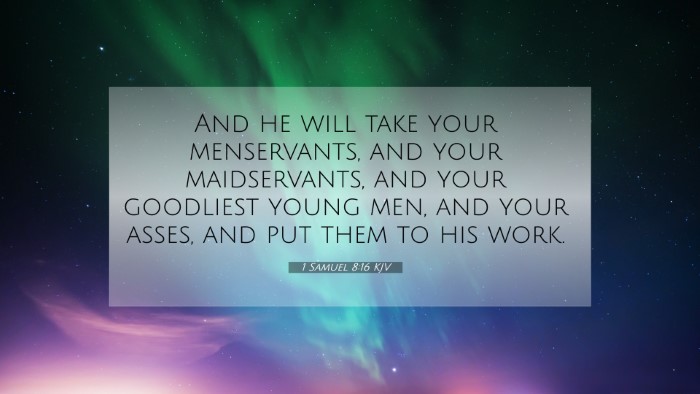Bible Verse Study: 1 Samuel 8:16
Bible Verse: 1 Samuel 8:16 - "And he will take your menservants, and your maidservants, and your goodliest young men, and your asses, and put them to his work." (KJV)
Understanding the Context
This verse falls within a crucial narrative in the history of Israel when the people demanded a king. Samuel, the prophet, was displeased by their request as it represented a rejection of divine kingship. The concerns expressed in this verse reflect warnings about the nature of monarchy and its implications for the people of Israel.
Insights from Public Domain Commentaries
Matthew Henry Commentary
Henry highlights that the Israelites, in their desire for a king, were forgetting the liberty and privilege of being governed directly by God. This verse illustrates the potential for tyranny as a king would exploit the populace by conscripting their resources—servants and animals—for his own purposes. Henry emphasizes the dangers of longing for worldly leadership over divine guidance.
Albert Barnes Commentary
Barnes expands on the notion of conscription, depicting the king's requirements as an infringement on personal freedoms. He points out that while the king may bring order and military might, it would come at the cost of the people’s autonomy and wealth. The reference to “goodliest young men” reflects the king’s demand for the best, which symbolizes the sacrifice and subjugation that comes with human leadership.
Adam Clarke Commentary
Clarke provides a deep dive into the sociopolitical structures of the time, suggesting that such conscription was common in neighboring nations. He notes that the people's wish for a king would lead to a culture of servitude and dependency on a centralized power—a stark contrast to the theocratic governance they previously enjoyed under God's direct authority.
Biblical Cross-References and Thematic Connections
This verse can be connected to various other scriptures that underscore the themes of leadership, servitude, and the consequences of demanding human rulers.
- Deuteronomy 17:14-20 - God’s guidelines for Israelite kings.
- 1 Samuel 10:17-19 - The people's demand for a king despite God’s warnings.
- 1 Samuel 12:12-17 - Samuel's warning about the king they have chosen.
- Isaiah 33:22 - "For the LORD is our judge, the LORD is our lawgiver, the LORD is our king; he will save us." - A reminder of God’s sovereign governance.
- Matthew 20:25-28 - Jesus teaches about servant leadership, contrasting worldly rulers with divine principles.
- Romans 13:1 - "Let every soul be subject unto the higher powers." - Paul speaks to submission to authorities, emphasizing God's order.
- Hebrews 13:17 - Obeying leaders, highlighting the responsibility of leadership.
- 1 Peter 5:2-3 - An admonition for leaders not to be domineering but examples for the flock.
- Proverbs 29:2 - "When the righteous are in authority, the people rejoice: but when the wicked beareth rule, the people mourn."
- Jeremiah 2:13 - "For my people have committed two evils; they have forsaken me the fountain of living waters, and hewed them out cisterns, broken cisterns, that can hold no water." - A parallel on forsaking God for earthly systems.
Conclusion
1 Samuel 8:16 serves as a profound warning about the implications of desiring human authority over divine leadership. This passage invites reflection on the nature of governance and the responsibilities of both leaders and the led. The connections to other scriptures emphasize the timeless relevance of this theme across biblical narrative, urging readers to consider the prophetic warnings of conscription, servitude, and the rich fulfillment found in divine authority.
Further Study
If you are interested in exploring more about biblical cross-references and understanding the dialogues between scriptures, consider using tools such as a Bible concordance or a cross-reference Bible study guide. These resources can assist you in identifying connections between Old and New Testament scriptures and engaging in a comparative study of biblical themes that resonate across different books of the Bible.


